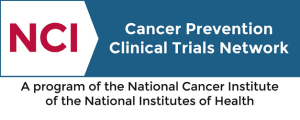
The Cancer Prevention Clinical Trials Network (CP-CTNet) performs early phase clinical trials to assess the safety, tolerability, and cancer preventive potential of agents and interventions. By conducting prevention studies on people at increased risk due to inherited conditions, certain conditions that are associated with developing cancer, lifestyle-related risk or environmental exposure, the hope is to develop safe drugs and approaches that can decrease the risk of cancer.
These interventions target molecules or processes known to be important during carcinogenesis, such as cell proliferation (growth), apoptosis (programmed cell death), growth factor expression, oncogene expression, and immune response. The data from these trials help to develop further scientific insights into the mechanisms of cancer prevention, including the development of novel potential markers of response.
CP-CTNet trials are carried out across the United States and include phase 0 (micro-dosing), phase I (dose-finding), and phase II (preliminary efficacy) clinical. The overall goal of the network is to identify safe and effective preventive interventions that can move into large-scale clinical trials. See a list of trials.
On This Page
- All Heading 2s will automatically be pulled in to this list.
- Do not edit the content on this template.
Funding Opportunities and Application Information 2024
No matching Funding Opportunities were found.
Program Guidelines for CP-CTNet
The Program Guidelines are available as a PDF.
Important Links
Clinical Trial Management Information can be found at CP-CTNet Instructions, Forms and Templates.
The data and biospecimens from several early phase prevention studies are available for request from the Cancer Data Access System (CDAS).
The link to the DMACC website can be found here: Data Management, Auditing and Coordinating Center (DMACC).
Downloadable files
Newsletters
The CP-CTNet Newsletter shares programmatic and research updates for the Cancer Prevention Clinical Trials Network (CP-CTNet). See the latest and all previous issues on the DMACC website.
I-SCORE Meetings
The Investigators-Site Coordinators Opportunity for Research Excellence (I-SCORE) meetings are held annually to stimulate information sharing and collaborations among DCP staff and Consortia members and to develop strategies to scientifically and operationally enhance DCP’s research program.
2025 I-SCORE will be held March 27-28, 2025 at NCI Shady Grove. For more information visit https://events.cancer.gov/dcp/iscore.
How Investigators Can Use CP-CTNet to Conduct Their Own Research
Accruing adequate numbers of study participants is a persistent challenge, especially for independent researchers. CP-CTNet, a cancer prevention research cooperative agreement-funded network, can provide a rich resource of individuals at risk for cancer who may be interested in participating in clinical trials.
- An investigator interested in conducting a clinical trial with an agent ready for clinical testing can join a Lead Academic Organization to become an Affiliated Organization
- An investigator who wishes to provide an agent for clinical study (but not to perform the clinical trial) can discuss with NCI/DCP if the agent is appropriate for study in CP-CTNet and then enter into a formal agreement with NCI/DCP to allow CP-CTNet to perform the trial
- An investigator with a potential agent that requires more efficacy assessment or toxicology studies before moving to a clinical trial can be directed to the NCI/DCP PREVENT Cancer Preclinical Drug Development Program (PREVENT)
NCI/DCP has developed guidelines and processes to assist investigators in accessing CP-CTNet.
The CP-CTNet funding supports the Lead Academic Organizations (LAO) and the organizations affiliated with the LAO Sites. These funds are directed to the management and oversight of clinical trials, trial conduct, participant care as well as primary and major secondary endpoint analyses. Additional outside funds, such as those from institutional, foundation, or other grant programs may be utilized.
For more information, contact Goli Samimi, Ph.D., M.P.H., CP-CTNet Director, at goli.samimi@nih.gov.
Program Contact(s)
Goli Samimi, Ph.D., M.P.H.
Email: goli.samimi@nih.gov
News and Events

A national early phase clinical trials network to assess the safety, tolerability, and cancer preventive potential of interventions.
